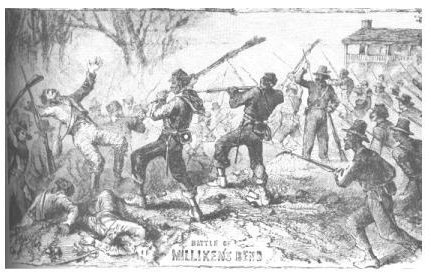Determination and Tenacity
|
 USCT at Dutch Gap Virginia, Library of Congress
USCT at Dutch Gap Virginia, Library of Congress
The roots of Black Civil War soldier determination was the American Slavery system. It was a system that rewarded those that dehumanized slaves. The humiliation associated with dehumanized treatment is best described by the former slaves that experienced it.
“Dere wuz Uncle George Bull. He could read and write, and, chile, de white folks didn't lak no nigger what could read and write. Old man Carr's wife, Mis' Jane, uster teach us Sunday school, but she did not 'low us to tech a book wid us hands. So dey uster jes' take Uncle George Bull and beat him fur nothin'. Dey would beat him, and take him to de lake, and put him on a log, and shev him in de lake, but he always swimmed out. When dey didn't do dat, dey would beat him till de blood run outen him, and den t'row him in de ditch in de field, and kivver him up wid dirt, head an ears, and den stick a stick up at his haid. I wuz a water toter and have stood and seen 'em do him dat way more'n once, and I stood and looked at 'em till dey went 'way to de other rows, and den I grabbed de dirt offen him, and he'd bresh de dirt off and say, "T'ank yo'," git his hoe, and go on back to work. Dey beat him lak dat, and he didn' do a thin' to git dat sort uf treatment.”
-MARGRETT NICKERSON
Bull Whip Days pg199
In the slave narratives John Finnely describes how he was used as a hunting dog: Massa use me for huntin', and use me for de gun rest. When him have de long shot, I bends over and puts de hands on de knees, and Massa puts his gun on my back for to git de good aim. What him kills I runs and fetches, and I carries de game for him... He say, "Swim in dere and git dat duck.” I says, "Yes, sar, Massa, " but I won't go in dat water till Massa hit me some licks.”
When the black mans shackles were removed and replaced with a musket the slave was transformed into a soldier. Sergt. Spencer described his transformation at the dedication of a school for black children after the fall of Fort Hudson. “But since I has come here to de Yankees, and been made a soldier for de Unite States, an' got dese beautiful clothes on, I feels like one young man ; and I doesn't call myself a old man nebber no more. An' I feels dis ebenin' dat, if de rebs came down here to dis old Fort Hudson, dat I could jus fight um as brave as any man what is in the Sebenth Regiment. Sometimes I has mighty feelins in dis ole heart of mine, when I considers how dese ere ossifers come all de way from de North to fight in de cause what we is fighten fur. How many ossifers has died, and how many white soldiers has died, in dis great and glorious war what we is in! And now I feels dat, fore I would turn coward away from dese ossifers, I feels dat I could drink my own blood, and be pierced through wid five thousand bullets... 'Fore I would be a slave 'gain, I would fight till de last drop of blood was gone. I has 'cluded to fight for my liberty and for dis eddication what we is now to receive in dis beautiful new house what we has.”
The tenacity and determination of Black troops is best supported by their opponents. A captain in the 13th Kentucky Cavalry opposed the enlistment of blacks and nearly murdered a recruiting officer for the USCT, described black troops at the Battle of Saltville Virginia: "never saw troops fight like they did. The rebels were firing on them with grape and canister and were mowing them down by the Score but others kept straight on."

Confederate General McColloch described black troops at The Battle of Milliken’s Bend: "The white or true Yankee portion ran like whipped curs almost as soon as the charge was ordered." while the blacks resisted with "considerable obstinacy," yet they could not hold the levee."
In a letter to his mother a Union officer wrote: "I have talked with numbers of Paroled Prisoners in Vicksburg, and they all admit it was the hardest stroke that there cause has received-the arming of the negrow. Not a few of them told me that they would rather fight two Regiments of White Soldiers than one of Niggers. Rebel Citizens fear them more than they would fear Indians. "
 LIBRARY OF CONGRESS
LIBRARY OF CONGRESS
The Gospel Army Black History Group, contact: thegospelarmy@yahoo.com
Copyright © 2006 The Gospel Army Black History Group. All rights reserved.
Revised: 06/10/08.